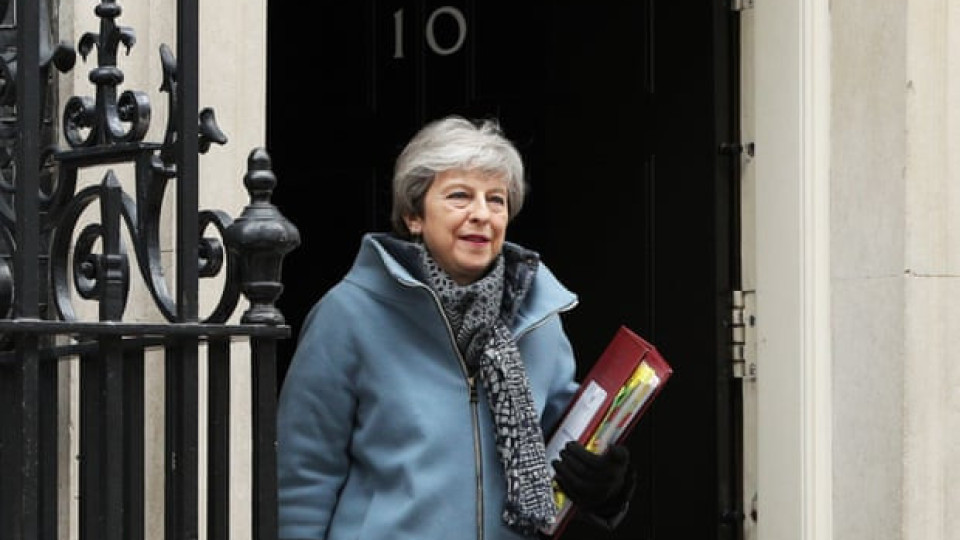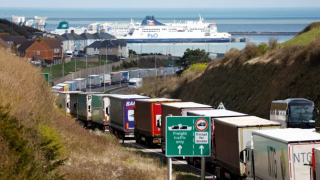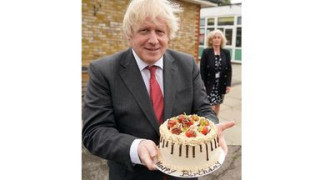
Theresa May has played her final desperate card to tame the Brexit rebels in her warring party, by promising to sacrifice her premiership if they back her twice-rejected Brexit deal.
The beleaguered prime minister, whose authority has been shattered by the double rejection of her deal and the humiliation of a delay to Brexit day, made the offer to Tory backbenchers at a packed meeting in parliament.
It came as MPs held backbench-led “indicative votes” on eight alternative Brexit options, including no deal, a referendum, a customs union and a Norway-style deal – none of which secured a majority.
May told her party’s backbench 1922 Committee: “I have heard very clearly the mood of the parliamentary party. I know there is a desire for a new approach – and new leadership – in the second phase of the Brexit negotiations, and I won’t stand in the way of that.”
She added: “I am prepared to leave this job earlier than I intended in order to do what is right for our country and our party.”
Her high-stakes pledge came on another dramatic day in Westminster, as:
• Boris Johnson and Iain Duncan Smith led a stream of Eurosceptics to support May’s deal.
• MPs failed to coalesce around an alternative to the deal in a series of “indicative votes”.
• Labour’s divisions on Brexit were exposed, as three members of Jeremy Corbyn’s shadow cabinet defied the whip to resist backing a second referendum.
• The DUP threw May’s chances of getting her deal through parliament into doubt by saying its MPs would not support it.
The prime minister had hoped to remain in No 10 after exit day, and build a legacy that extended beyond the humiliations of the Brexit talks to domestic policy.
But if the withdrawal agreement is passed and Britain leaves the EU in eight weeks’ time, she could now be gone before the summer – after just three years in the top job.
Three ministers resigned on Monday to back an amendment tabled by a cross-bench group of MPs led by the Tory former minister Oliver Letwin to test the backing for alternatives to the prime minister’s deal.
On Wednesday night, Letwin said it was “a great matter of disappointment” that no majority had emerged for any of the eight options debated that day. He said another set of votes would be held on Monday – but he hoped that May’s deal would be accepted before then.
The closest result was on a commitment for the government to negotiate a “permanent and comprehensive UK-wide customs union with the EU” in any Brexit deal. Put forward by the pro-EU Tory veteran Ken Clarke and others, it was voted down by 272 votes to 264.
The only other relatively close vote was on a plan drawn up by the Labour MPs Peter Kyle and Phil Wilson, and tabled by the former foreign secretary Margaret Beckett, to require a referendum to confirm any Brexit deal. This was lost by 268 votes to 295.
Backers of a referendum said the result showed they were gaining ground. Labour’s deputy leader Tom Watson said: “When this parliament has finally made a decision on what Brexit means, I am hopeful that a majority will emerge for any final proposal to be put to a vote, not only by MPs, but also by the people.”
However, 27 Labour MPs defied a three-line whip to vote against a referendum, with one shadow minister, Melanie Onn, resigning in order to do so and three shadow cabinet members abstaining.
May was forced to give her MPs a free vote – and instructed her cabinet to abstain – rather than suffer a string of resignations from ministers keen to signal their support for alternatives.
The government had earlier tried and failed to stop the indicative vote process happening altogether, by whipping MPs to reject the business motion kicking off the debate.
The Brexit secretary, Steve Barclay, said: “The results of the process this House has gone through today strengthens our view that the deal the government has negotiated is the best option.”
Ministers now hope to make a third attempt to ram May’s deal through the House of Commons on Friday – though their prospects of success were thrown into doubt after the DUP said its 10 MPs would vote against it.
The prime minister had been under intense pressure to set out a timetable for her departure, as the leave-supporting wing of her party continued to resist supporting her deal, which was defeated by a majority of 149 earlier this month.
Outside the 1922 meeting, the Tory MP Simon Hart, who leads the Brexit Delivery Group, said: “She made it very clear: I want the next prime minister to be one of the colleagues in there tonight, not down the corridor at the PLP [parliamentary Labour party] meeting.”
The response from MPs was “respectful recognition for her hard work and service, not celebration”, he said.
Several of the most determined Brexit holdouts, including Rees-Mogg, Duncan Smith and Johnson, were invited to the prime minister’s country retreat of Chequers on Sunday.
They denied that any pact about her departure had been made, but just minutes after May’s emotional promise Johnson told colleagues at the European Research Group (ERG) that he would now support the deal, saying the next phase of talks would have to have a “change of tone and mandate”.
Rees-Mogg had already suggested he could vote for the deal, fearing it was now the only way of ensuring Britain leaves the EU. However, he later suggested he could not support it if the DUP remained opposed.
EU27 leaders granted Britain a delay to Brexit to 22 May in Brussels last week – but only if May’s deal wins the support of parliament this week. Downing Street suggested that a leadership contest could kick off soon afterwards, but only if her deal is passed.
If it is not supported this week, the prime minister must return to Brussels before 12 April to set out what she plans to do next – and potentially request a longer extension.
Ministers signalled that they would now hold an extra parliamentary session on Friday, in the hope of winning a third “meaningful vote” – if they can persuade enough Tory rebels to switch sides.
The Speaker, John Bercow, stressed on Wednesday that he would not allow the government to table the same deal for a third meaningful vote.
But ministers were considering plans to hold the first reading of the withdrawal agreement bill – giving MPs a vote on the flagship bill implementing the deal, rather than a similar motion.
The Guardian











Leave a comment